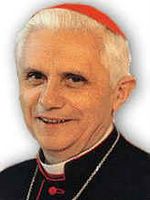
Pope Benedict XVI

The May 2 issue of Time had some interesting things to say about the new Pope. Writer David Van Biema called it The Turning Point, the story of Vatican II reformer Joseph Ratzinger turned arch-conservative and present Pope Benedict XVI . You can't read it online so I'll recap the part that caught my eye.
It was liberal Swiss theologian Hans Kung who recruited Ratzinger to the theology department at the University of Tubingen in 1966. "Back then we were on the same side," says Kung. But Ratzinger’s tenure at the university coincided with the ‘West German version of the 1968 student protests in other parts of the world but with less psychedelia and more Marx.’
The university became a hotbed of radical theology. Students distributed flyers calling the Cross a sadomasochistic artifact. They threw tomatoes and yanked away professors’ microphones to disrupt lectures and force “dialogue.” “Those were rough times,” remembers Kung. “And Ratzinger did not digest them well.”The experience was particularly traumatic because Ratzinger had advocated - and was known for advocating - greater openness. According to Wolfgang Beinert, an assistant and friend of Ratzinger’s at the time, Tubingen “triggered a huge fright. Ratzinger believed that he was in some way responsible, guilty of the chaos, and that the university and society and church were collapsing.”
In another write-up in Newsday, headlined, Pope Journeyed from Reformer to Enforcer Jeffrey Fleishman quotes Kung:
"Ratzinger is a letter writer, not a man of confrontation, and he was deeply disturbed by these Marxist commandos. He was wounded internally. He felt betrayed. It was a decisive moment for him. He's timid and suspicious and he developed a complex against reforms."The New York Times while echoing the same thought had more to say when it wrote that campus turbulence in the 60s hardened Ratzinger's views [subscription required]:
The experience of the student revolt seemed to confirm every suspicion that Father Ratzinger already nurtured about liberalizing tendencies and the hidden germ of totalitarianism lurking within revolutionary movements.But the article also added that Max Seckler, then the dean of the Catholic Theological Faculty and now professor emeritus at Tübingen did not think the new Pope was shocked into becoming a conservative:
"He didn't become a conservative, but he understood that every reform brings out a bad spirit as well as a good spirit and that he needed to be more discriminating, that he had been naïve in his way of thinking."However you see it, I have no quarrel in a Pope being conservative. Although there's much to disagree with the Catholic Church, there is something to be said about a church leader who still holds on to the authority of Scripture when loud voices demand he loosens up on traditional moral values because, duh, this is the 21st century. (But I happen to stand with Kung whose rejection of papal infallibility got him into trouble with the Church)
I like the phrase 'the hidden germ of totalitarianism' which I think not only lurks within revolutionary zeal, but also within the human spirit. When God's Word is no longer recognised as authority, no alternatives exist that give more than they take away.
2 comments:
I'm really being educated here :) Thanks for the very meaty posts. Enjoyed ur recent Kairos write-up too. Cheers.
Thanks for visiting - we are all learning :-)
Incidentally, I just got a copy of the magazine Friday!
Post a Comment